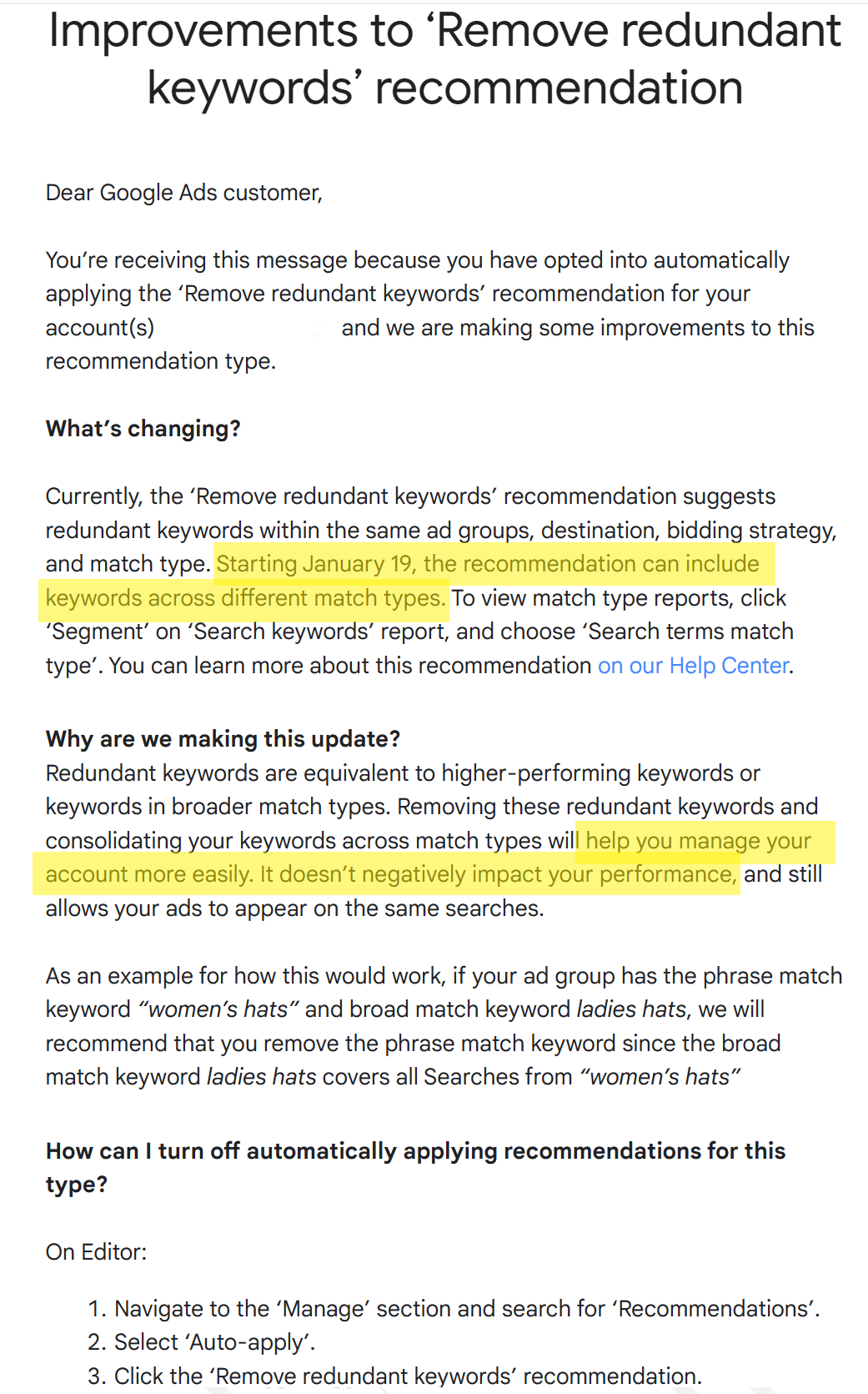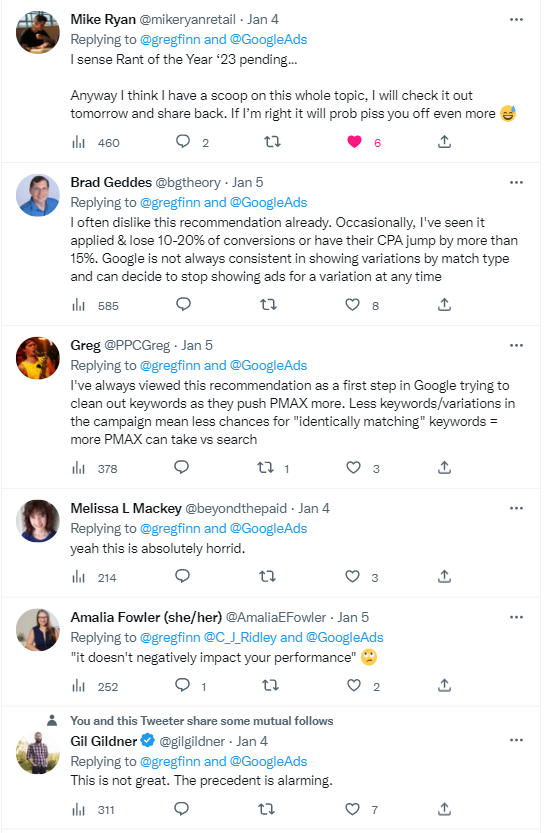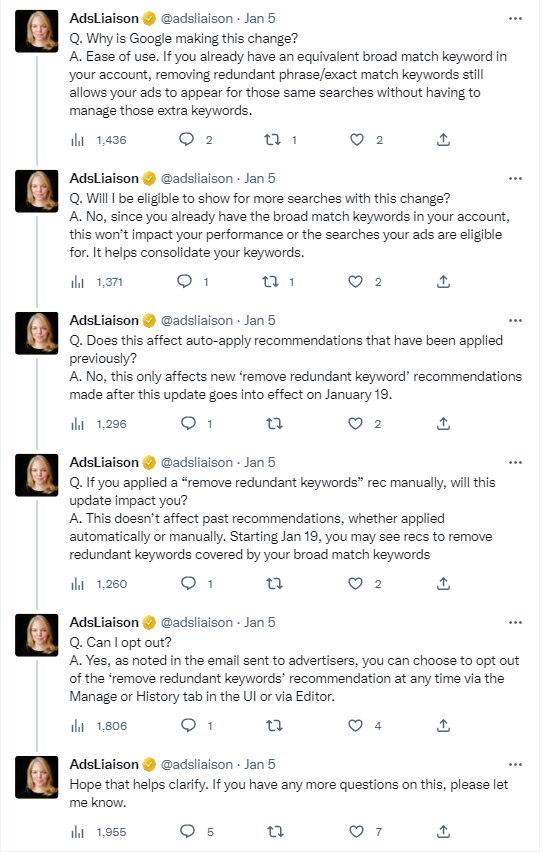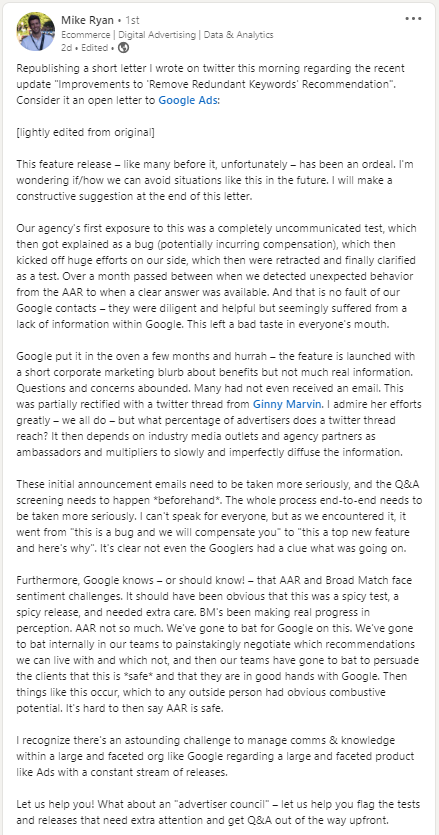What way to ring in the new year with a fresh Google Ads update?
On January 4, Google emailed advertisers who currently have the auto-applied suggestion “remove redundant keywords” enabled on their accounts.
The email stated starting January 19, Google will begin removing redundant keywords across different match types.
First reported by Robert Brady via Twitter, advertisers quickly took to numerous social media outlets to share their concerns over the new update.
What’s Changing?
Currently, one of Google’s auto-applied suggestions allows the system to remove redundant keywords of the same match type within the same ad group.
With the January 19 update, Google’s updated its policy to remove redundant keywords across different match types.
Essentially, Google will remove phrases or exact match keywords if a broad keyword covers the search query.
A portion of the email from Google below outlines more detail:

Advertisers Alike Cause Uproar
Greg Finn didn’t hold back his opinion on the policy update announcement:
On what planet does this make sense?
Google Ads is changing the definition & execution of a recommendation AFTER IT HAS ALREADY BEEN APPLIED.
This should be a different recommendation.
How could anyone EVER apply a @GoogleAds recommendation to an account again?#ppcchat pic.twitter.com/9j9GUZDReY
— Greg Finn (@gregfinn) January 4, 2023
Other marketers chimed in on Greg’s post with similar sentiments:

So, what makes this update so controversial with marketers?
As others have pointed out, one of the main concerns is that Google has changed the definition of an existing auto-applied recommendation.
With such a significant change, it’s argued that this should be a new recommendation for advertisers to opt in or opt-out of.
Another concern is around Google’s ability to address context and sentiment in a correct matter.
Lastly, the consensus is that these updates are again aimed at small businesses and beginner marketers to manage their accounts more efficiently.
But where does that leave the experienced marketers who have spent years testing and perfecting their keyword strategies?
Google Ads Liason Addresses Advertiser Concerns
After reaching out to Google for comment, the official Google Ads Liason responded via Twitter on January 5:
1/4 Today, we’re announcing an update on similar audiences and transition to more durable audience solutions. Here’s why we’re making a change and a look at the timeline (starting in 6 months):
— AdsLiaison (@adsliaison) November 1, 2022

Advertiser Mike Ryan put together a well-thought-out response that was well-received by the PPC community on LinkedIn. He included a suggestion to help avoid situations like this in the future. The thread continues with additional clarification and FAQs:
Marvin followed up on Ryan’s open letter to Google Ads via another comprehensive Twitter thread:
Hi Mike, As others have noted, this is a very thoughtful response, thank you. Having been in advertiser/agency shoes for many years, I understand your POV. I’ll try to address your note and share a bit of perspective from my role now…
— AdsLiaison (@adsliaison) January 6, 2023
In the thread reply, Marvin addressed the following from Ryan’s letter:
- The test went through multiple iterations before launching
- The test was paused early on due to a bug
- Many experiments at a time can cause communication challenges
- Overall results of the redundant keyword experiment were positive
Summary
If you are already opted into Google’s auto-applied recommendation to remove redundant keywords, the new policy will go into effect on January 19.
The new policy will not make any retroactive changes to your account. However, because this is not a new recommendation, you would have to disable this auto-applied recommendation if you do not wish to participate.
A significant change from Google so early on in the new year could be an indicator of even more significant changes later on.
The open dialogue between advertisers and the Google Ads Liason is an excellent step towards further transparency and consideration for all marketers – beginner or experienced.
A special thank you to Google Ads Liason Ginny Marvin for promptly addressing advertisers’ questions and transparently.
Featured Image: ViDI Studio/Shutterstock






![AI Overviews: We Reverse-Engineered Them So You Don't Have To [+ What You Need To Do Next]](https://www.searchenginejournal.com/wp-content/uploads/2025/04/sidebar1x-455.png)